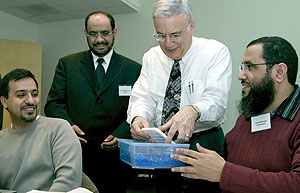The School of Medicine’s Health Administration Program, in cooperation with BJC HealthCare’s International Healthcare Services, has launched a unique executive master’s program for Saudi Arabian physicians and health-care ministry executives at the request of the Saudi Ministry of Health.
The two-year executive master in health administration program was created specifically for 18 participants from the Riyadh-based King Fahad Medical City, a four-hospital system that is one of the largest medical complexes in Saudi Arabia.

The Saudi Ministry of Health approached the School of Medicine after Ali Al-Shanqeeti, M.D., a Saudi physician, completed a three-year fellowship at the School of Medicine and began working for the ministry. Based on the School of Medicine’s worldwide reputation and the desire to affiliate with a top-flight school, Al-Shanqeeti contacted the University to collaborate on a program that would prepare some of the ministry’s top executives to manage Saudi Arabia’s changing health-care system.
“Health-care systems in the world are all changing, and the ministry sees the need to train executives in the basic principles of management, finance and organization to improve health care for the population the King Fahad Medical City serves,” said Daniel K. Mueller, Ph.D., assistant vice chancellor for international affairs.
“These executives will be the ones to plan the health-care future for the Middle East and Saudi Arabia. We want to help them increase the level of leadership from Saudi-based executives.”
The executives and physicians are on the medical campus completing the first of two residency requirements for the program. The two groups will take classes here for two weeks, learning about business communications, economics and systems and data analysis from health administration program faculty.
The program also includes distance learning via interactive Web-based conferencing, Mueller said. Some faculty members will travel to Saudi Arabia to teach the participants for another portion of the program.
The executive master’s program took more than a year to develop, said Stuart B. Boxerman, D.Sc., associate professor and director of the health administration program. Work is already under way to offer a similar program to a university in China, Mueller said.
Because only about 11 percent of Saudi Arabia’s physicians are Saudi Arabian, the ministry wanted to improve the level of leadership from Saudi-based executives, Mueller said.
One of the lessons the program teaches is the importance of enhancing health care by improving the processes hospitals use. Boxerman uses the “Red Bead Game” to illustrate this lesson. Participants scoop 50 beads from a box containing 4,000 blue beads, representing good products, and 1,000 red beads, which represent mistakes or defective products. Even though they are told they should end up with only one red bead for every 25 blue, the participants inevitably withdraw an average of five red beads out of 25, equivalent to a 20 percent error rate.
“The whole idea is to introduce students to the fact that how a hospital’s processes are designed influences the rate with which errors will be made,” Boxerman said. “To reduce errors in health care — to give higher quality care — you need to improve the health-care system’s processes.”
Fahmi Mohammad Al-Senani, the head of King Fahad Medical City’s neurology division and a consultant neurologist, and Jumah Farhan Al-Onizi, associate executive director of patient affairs at King Fahad Medical City, said the skills they learned in the business communications course, taught by Annette M. Veech, Ph.D., senior lecturer in the Olin School of Business, are among the most important things they learned during their stay.
Al-Onizi also said the information he learned in economics, taught by Dennis L. Lambert, Ph.D., instructor in health administration and director of placement, was very beneficial, particularly on how to finance a health-care system.
Lambert, who will be going to Saudi Arabia this summer to teach the participants with Ronald E. Gribbins, Ph.D., adjunct assistant professor of health administration, said the program was a good experience for him, both professionally and personally.
“We found some differences and also found how much we’re all the same,” Lambert said.